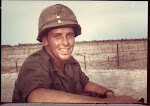As of this writing, those areas of Iraq are now in danger of falling under the control by ISIS (The Islamic State). Now, as then, that population has welcomed the backing of these extremist groups because they offered them support against the ruling government. President Nouri al-Maliki, in office in 2007, ran the government along Shia sectarian lines, as does the present Prime Minister Haider al-Abadi. Increasingly, Sunni citizens have been coming under attack by Shia militias supposedly linked to the government.
In 2007, I was embedded with the 2nd Brigade Combat Team, 10th Mountain Division, headquartered at Camp Stryker SE of BIAP (Baghdad International Airport). This unit’s AO (area of operations) was the 350 sq. mile “triangle of death” located southeast of Baghdad and southwest of the Euphrates River. Main population centers were Mahmadiyah and Yousifiyah, and Col. Michael Kershaw was their Commanding Officer.
This was the year of the “Sunni Awakening”, the name applied to the movement of Sunni tribes that were convinced to drop AQI and to begin co-operating with the legal government. This came about primarily through the hard work and dogged patience of soldiers from the 10th Mountain Division of the US Army. At that time, Sunni resistance units organized in the 10th Mountain’s AO were called Iraqi Provincial Volunteers.
“I think it might have been a good thing that we weren’t able to get in here for eleven months,” Capt. Ryan Liebhaber of the 10th Mountain Division told me at that time, “because their methods are what turned off the locals who were supporting them. These people are secular basically, not of the fanatical Muslim extreme at all, and when it became common to cut off fingers for smoking a cigarette, well, that was it. Smoking is about the only vice they have left that isn’t a sin.” Capt. Liebhaber smiled, and then continued, “They also weren’t above killing and raping. By the time we and the local leaders got together, they were as eager to talk and work with us, as we were with them.”
That statement shows how desperate the Sunni population must have become for them to turn back to the ISIS, formerly AQI, for support. Reports from the field indicate that they had no choice.
 |
| A truck is stopped along the highway in 2007 in Iraq; the man in the back and another person were digging at the spot. They were suspected of setting mines along this route between Tikrit and Kirkuk. |
Phone conversations with public affair officers from Combined Joint Task Force Inherent Resolve, located in Kuwait, have been inconclusive regarding the influence of ISIS in these areas.
A more recent email from Maj. Kim Michelsen, public-affairs officer with Operation Inherent Resolve, indicated that, presently, Mahmadiyah, Yousifiyah, Zaidon and points north towards Tikrit are free of ISIS control, however, the loyalty of their Sunni population remains questionable.
Many of the inhabitants had been soldiers in the Iraqi Army of Saddam Hussein, or Baath Party members who were civil servants in the former government. These people were all relieved of their jobs by the Coalition Provisional Authority led by H. Paul Bremmer, a U.S. government appointee. Aside from there being huge resentment from being fired and the fact that, in the case of the military, 100,000 angry, armed men were turned loose on the countryside, none of these people had any other way to make a living. They were ripe for opposition to the new government being formed by the U.S.
 |
| These men were formerly fighters with al Qaeda in Iraq and decided to switch sides after working with troops from the 10th Mountain Division. Many of these men have gone over to ISIS after being left out of the current Shia dominated government. |
“Former soldiers from the old army that I’ve met have told me that they couldn’t believe it was happening,” said Col. Kershaw at the time. “They thought they’d be called back in for a reorganization in a matter of days.”
That didn’t happen, and today most of the Sunni opposition under the direction of ISIS is made up of former Iraqi Army personnel and Ba’ath Party civil servants of the old government who were also were relieved of their jobs. These people feel that their only realistic choice is ISIS.
The Sunni People of Iraq need an alternative to ISIS.
In 2007, U.S. soldiers were able to convince large segments of the Sunni population to turn against AQI and to work with them to eventually form a working relationship with the al-Maliki government. The current Iraqi government, which is still being led by Shia politicians, hasn’t been able to resurrect the Sunni Awakening or anything resembling it. The eventual solution might well be within borders of an Islamic State, minus the present leadership.
Presently, Tikrit appears to be liberated from ISIS forces by the Iraqi Army, aided by Shia militias led by Iranian military personnel. News that the primarily Sunni population of Tikrit welcomes this development has not been forthcoming.
One should bear in mind that the Sunni population of Iraq, which numbers in the millions, are the same people who joined the government and worked with US forces in 2007. Bombing them will accomplish nothing but to stiffen resistance to the present government and drive them further into the arms of ISIS.
As Col. Michael Kershaw said in 2007: “Whoever in the end can provide security and justice for the ordinary people of Iraq, they will be the winner in this conflict.”




























